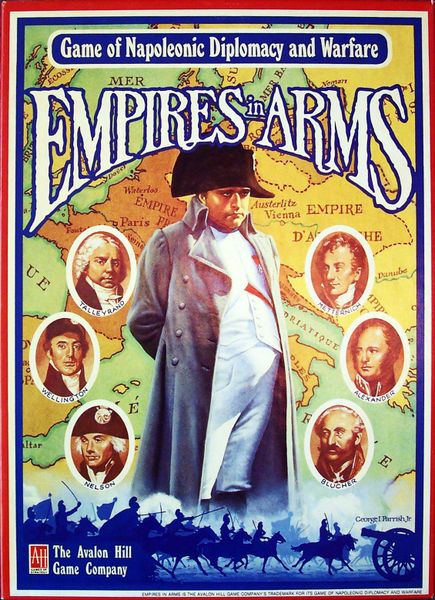Empires in Arms (1983) Board Game
Empires in Arms is a classic board game that was first released in in 1983. Developed by a team of designers including Michael Fisher, Charles Kibler, and George I. Parrish, Jr., the game is set during the Napoleonic Wars and focuses on diplomacy, negotiation, and strategic military planning.
Game Components of Empires in Arms
How To Setup Empires in Arms
To set up the game, players first bid victory points to determine which country each player will control. The player bidding the most points for a country gets to play that country, though weaker countries can be competitive with lower bids. Each player starts with a unique mix of economic and military power. The game board is set up with initial troop and ship placements, and players prepare for the first turn by understanding the four main phases: Diplomatic, Reinforcement, Naval, and Land, with an additional Economic phase every three months.
Gameplay Mechanics and Game Objective
Player Experience
Playing Empires in Arms is a deeply immersive and complex experience. Players must manage intricate military and naval operations, negotiate alliances, and make economic decisions. The game requires a significant time commitment and a willingness to navigate complex rules and strategies. Combat involves a combination of leader stats, force strength, morale, and strategic combat chits, making each battle a tactical puzzle. Diplomacy is crucial, as players can win the game without declaring war by focusing on alliances and economic growth.
Pros
Cons
Personal Thoughts on Empires in Arms
Empires in Arms is for the seasoned wargamer or anyone willing to dive deep into complex strategy and historical detail. It’s not a game for the faint of heart due to its lengthy gameplay and intricate rules, but it offers a rewarding experience for those who enjoy grand strategy and the nuances of the Napoleonic era. If you’re looking for a game that combines military tactics, diplomatic maneuvering, and economic strategy, Empires in Arms is a unique and engrossing experience that stands out in the world of board games.
We are supported by our audience. When you purchase through links on our site, we may earn an affiliate commission, at no extra cost for you. Learn more.

